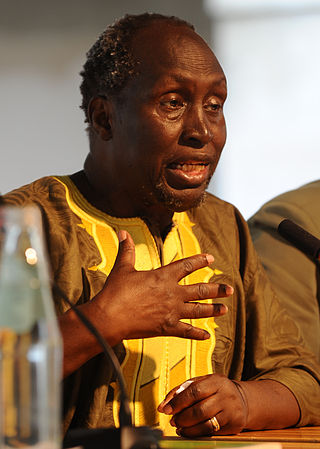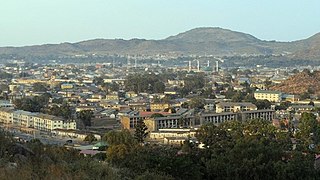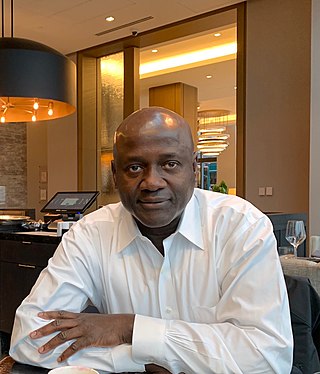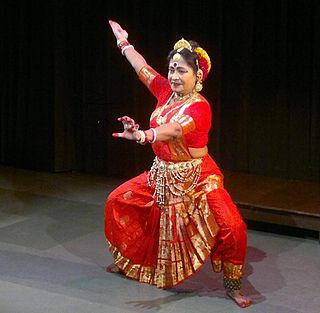
Ngũgĩ wa Thiong'o is a Kenyan author and academic, who has been described as "East Africa's leading novelist". He began writing in English, switching to write primarily in Gikuyu. His work includes novels, plays, short stories, and essays, ranging from literary and social criticism to children's literature. He is the founder and editor of the Gikuyu-language journal Mũtĩiri. His short story The Upright Revolution: Or Why Humans Walk Upright has been translated into 100 languages.

Jos is a city in the North-Central region of Nigeria. The city has a population of about 900,000 residents based on the 2006 census. Popularly called "J-Town", it is the administrative capital and largest city of Plateau State. The city is situated on the Jos plateau which is embedded in the Guinea Savannah of North-Central Nigeria. It connects most of the North-Eastern capitals to the Federal Capital Territory Abuja, by road. Driving in and out of Jos, traffic encounters very steep sloppy bends and mountainous sceneries typical of the plateau landform. The name of the state was coined from its affiliation to this landform.
In June 1962 a conference of African literature in the English language, the first African Writers Conference, was held at Makerere University College in Kampala, Uganda. Officially called a "Conference of African Writers of English Expression", it was sponsored by the Congress for Cultural Freedom and the Mbari Club in association with the Department of Extra-Mural Studies of Makerere, whose director was Gerald Moore.

Makurdi is the capital of Benue State, located in central Nigeria, and part of the Middle Belt region of central Nigeria. The city is situated along the Benue River. In 2017, Makurdi's urban population was 517,342.
The African Writers Series (AWS) is a collection of books written by African novelists, poets and politicians. Published by Heinemann, 359 books appeared in the series between 1962 and 2003.

The Nigerian Television Authority or NTA is a Nigerian government-owned and partly commercial broadcast station. Originally known as Nigerian Television (NTV), it was inaugurated in 1977 with a monopoly on national television broadcasting, after a takeover of regional television stations by military governmental authorities in 1976. After a declining interest from the public in government-influenced programming, it lost its monopoly over television broadcasting in Nigeria in the 1990s.
The Berom is one of the largest autochthonous ethnic group in Plateau State, central Nigeria. Covering about four local government areas, which include Riyom, Jos North, Jos South and Barkin Ladi (Gwol). Berom people are also found in some southern Kaduna State local government areas like Fadan Karshe with Berom settlers tracing their origins to Za'ang a Berom district on the Jos Plateau. They emigrated during the British Colonial Government of Nigeria. A large number of this tribe, if not all, are Christians. Statistics also have it that a large number of the population of Plateau State is made up of Berom people.

Jukun are an ethno-linguistic group or ethnic nation in West Africa. The Jukun are traditionally located in Taraba, Benue, Nasarawa, Plateau, Adamawa, Bauchi and Gombe States in Nigeria and parts of northwestern Cameroon. They are descendants of the people of Kwararafa. Most of the tribes in the north central of Nigeria trace their origin to the Jukun people and are related in one way or the other to the Jukuns. Until the coming of both Christianity and Islam, the Jukun people were followers of their own traditional religions. Most of the tribes, Alago, Agatu, Rendere, Goemai in Shendam, and others left Kwararafa when it disintegrated as a result of a power tussle. The Jukuns are divided into two major groups; the Jukun Wanu and Jukun Wapa. The Jukun Wanu are fishermen residing along the banks of the river Benue and Niger where they run through Taraba State, Benue State and Nasarawa State. The Wukari Federation, headed by the Aku Uka of Wukari, is now the main centre of the Jukun people.
Tanure Ojaide is a Nigerian poet and academic. As a writer, he is noted for his unique stylistic vision and for his intense criticism of imperialism, religion, and other issues. He is regarded as a socio-political and an ecocentric poet. He won the 2018 Wole Soyinka Prize for Literature in Africa with his collection Songs of Myself: A Quartet (2017).
Mak ’Kusare is a Nigerian film director who won three awards for his first feature length film Ninety Degrees in 2006 at the Zuma Film Awards in Abuja, Nigeria. He wrote, directed and produced the film entirely on location in Jos, Nigeria. The film won Best Director, Best First Film/Video of a Director and Best Feature Film awards. ’Kusare has also produced for radio, television and video.

Mĩcere Gĩthae Mũgo was a Kenyan professor, playwright, author, activist and poet. She was a literary critic and professor of Literature, Creative Writing and Research Methods in the Department of African American Studies at Syracuse University. She was forced into exile in 1982 from Kenya during the Daniel Arap Moi dictatorship for activism and moved to teach in the United States, and later Zimbabwe. She taught Orature, Literature, and Creative Writing.

Tijan M. Sallah is a Gambian poet and prose writer.

Mahua Mukherjee[Note] is an exponent of the Indian classical dance form Gaudiya Nritya. She is a researcher and teacher at Rabindra Bharati University and Dean of the faculty of fine arts as of January 2014. Along with her husband Amitava Mukherjee, she has been reviving the dance style through her career from 1980s. She has also given performances and lectures as visiting professor like at the University of Oklahoma, USA. She has learned the dance from Bratindranath, Sashi Mahato, Narottam Sanyal, Gambhir Singh Mudha, Mukund Das Bhattacharya and other practitioners of the Chhau, Nachni, Kushan and Kirtaniya traditions.

Decolonising the Mind: the Politics of Language in African Literature, by the Kenyan novelist and post-colonial theorist Ngũgĩ wa Thiong'o, is a collection of essays about language and its constructive role in national culture, history, and identity. The book, which advocates linguistic decolonization, is one of Ngũgĩ's best-known and most-cited non-fiction publications, helping to cement him as a preeminent voice theorizing the "language debate" in post-colonial studies.

The Aké Arts and Book Festival is a literary and artistic event held annually in Nigeria. It was founded in 2013 by Lola Shoneyin, a Nigerian writer and poet, in Abeokuta. It features new and established writers from across the world, and its primary focus has been to promote, develop, and celebrate the creativity of African writers, poets, and artists. The Aké Arts and Book Festival has been described as the African continent's biggest annual gathering of literary writers, editors, critics, and readers. The festival has an official website and a dedicated magazine, known as the Aké Review.
Adekunle “Nodash” Adejuyigbe, is a Nigerian film maker and producer; He has served as a producer and executive producer for several documentaries and commercials for international organisations and is considered one of the most outstanding directors and one of the most sought after cinematographers of the New Nigerian Cinema.

Chinedum Iregbu is a Nigerian Filmmaker and poet. Chinedum is currently the Quality Control Manager for EbonyLife TV, DSTV Channel 165. He is popularly known as Saint Maxzy or Maxzy.
Ogaga Ifowodo is a Nigerian lawyer, scholar, poet, columnist/public commentator and human rights activist. He was awarded the 1998 PEN/Barbara Goldsmith Freedom to Write Award, given to writers "anywhere in the world who have fought courageously in the face of adversity for the right to freedom of expression.
Wanjikũ wa Ngũgĩ is a Kenyan writer, who has lived and worked in Eritrea, Zimbabwe and Finland. She is the founder and former director of the Helsinki African Film Festival (HAFF). Also a political analyst, she is a member of the editorial board of Matatu: Journal for African Literature and Culture and Society, and has been a columnist for the Finnish development magazine Maailman Kuvalehti. Among journals and newspapers in which her work has appeared are The Herald (Zimbabwe), The Daily Nation, Business Daily, Pambazuka News and Chimurenga. She is the author of a novel published in 2014 and a contributor to anthologies including New Daughters of Africa: An International Anthology of Writing by Women of African Descent, Nairobi Noir.

Hausa literature is any work written in the Hausa language. It includes poetry, prose, songwriting, music, and drama. Hausa literature includes folk literature, much of which has been transcribed, and provides a means of recording, preserving, and transmitting knowledge, especially in regard to social, psychological, spiritual, or political roles.















